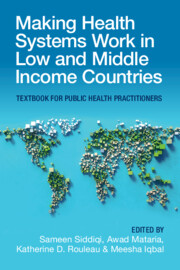 Making Health Systems Work in Low and Middle Income Countries
Making Health Systems Work in Low and Middle Income Countries from Section 1 - Analyzing Health Systems: Concepts, Components, Performance
Published online by Cambridge University Press: 08 December 2022
The process of decision making is not linear and is affected by multiple factors, other than availability of evidence, such as political context, personal over public interests, decision makers’ accountability, relationships with stakeholders, and familiar experiences in the past. Evidence-informed decisions positively influence access, quality, efficiency, equity, and sustainability of health services, and improve transparency and accountability thereby reducing wastage, abuse, and corruption in the health system. This chapter presents six decision making tools that help policy makers and managers take evidence-informed decisions: burden of disease analysis; health technology assessment; cost-effectiveness analysis; health equity analysis; national health accounts analysis; and stakeholder analysis. The list of tools is not exhaustive, and additional tools can be explored to respond to the context and nature of the public health concern. Policymakers are not expected to know all their methodological aspects, rather they should know what tools are available, their purpose and application, strengths and limitations, and how to interpret the results in the local context.
To save this book to your Kindle, first ensure [email protected] is added to your Approved Personal Document E-mail List under your Personal Document Settings on the Manage Your Content and Devices page of your Amazon account. Then enter the ‘name’ part of your Kindle email address below. Find out more about saving to your Kindle.
Note you can select to save to either the @free.kindle.com or @kindle.com variations. ‘@free.kindle.com’ emails are free but can only be saved to your device when it is connected to wi-fi. ‘@kindle.com’ emails can be delivered even when you are not connected to wi-fi, but note that service fees apply.
Find out more about the Kindle Personal Document Service.
To save content items to your account, please confirm that you agree to abide by our usage policies. If this is the first time you use this feature, you will be asked to authorise Cambridge Core to connect with your account. Find out more about saving content to Dropbox.
To save content items to your account, please confirm that you agree to abide by our usage policies. If this is the first time you use this feature, you will be asked to authorise Cambridge Core to connect with your account. Find out more about saving content to Google Drive.